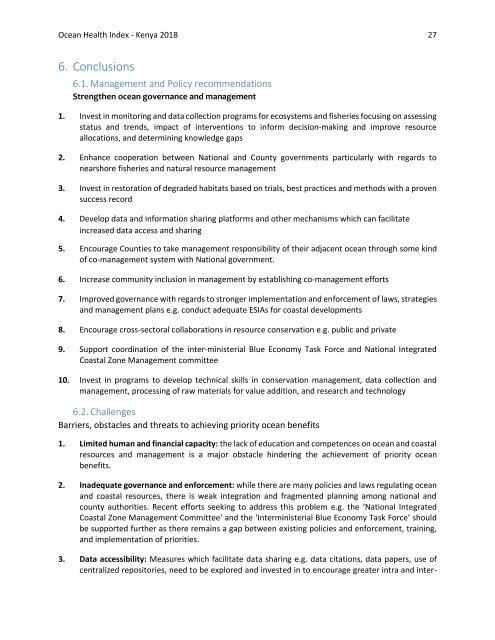Create successful ePaper yourself
Turn your PDF publications into a flip-book with our unique Google optimized e-Paper software.
Ocean Health Index - <strong>Kenya</strong> <strong>2018</strong> 27<br />
6. Conclusions<br />
6.1. Management and Policy recommendations<br />
Strengthen ocean governance and management<br />
1. Invest in monitoring and data collection programs for ecosystems and fisheries focusing on assessing<br />
status and trends, impact of interventions to inform decision-making and improve resource<br />
allocations, and determining knowledge gaps<br />
2. Enhance cooperation between National and County governments particularly with regards to<br />
nearshore fisheries and natural resource management<br />
3. Invest in restoration of degraded habitats based on trials, best practices and methods with a proven<br />
success record<br />
4. Develop data and information sharing platforms and other mechanisms which can facilitate<br />
increased data access and sharing<br />
5. Encourage Counties to take management responsibility of their adjacent ocean through some kind<br />
of co-management system with National government.<br />
6. Increase community inclusion in management by establishing co-management efforts<br />
7. Improved governance with regards to stronger implementation and enforcement of laws, strategies<br />
and management plans e.g. conduct adequate ESIAs for coastal developments<br />
8. Encourage cross-sectoral collaborations in resource conservation e.g. public and private<br />
9. Support coordination of the inter-ministerial Blue Economy Task Force and National Integrated<br />
Coastal Zone Management committee<br />
10. Invest in programs to develop technical skills in conservation management, data collection and<br />
management, processing of raw materials for value addition, and research and technology<br />
6.2. Challenges<br />
Barriers, obstacles and threats to achieving priority ocean benefits<br />
1. Limited human and financial capacity: the lack of education and competences on ocean and coastal<br />
resources and management is a major obstacle hindering the achievement of priority ocean<br />
benefits.<br />
2. Inadequate governance and enforcement: while there are many policies and laws regulating ocean<br />
and coastal resources, there is weak integration and fragmented planning among national and<br />
county authorities. Recent efforts seeking to address this problem e.g. the ‘National Integrated<br />
Coastal Zone Management Committee' and the ‘Interministerial Blue Economy Task Force’ should<br />
be supported further as there remains a gap between existing policies and enforcement, training,<br />
and implementation of priorities.<br />
3. Data accessibility: Measures which facilitate data sharing e.g. data citations, data papers, use of<br />
centralized repositories, need to be explored and invested in to encourage greater intra and inter-


















